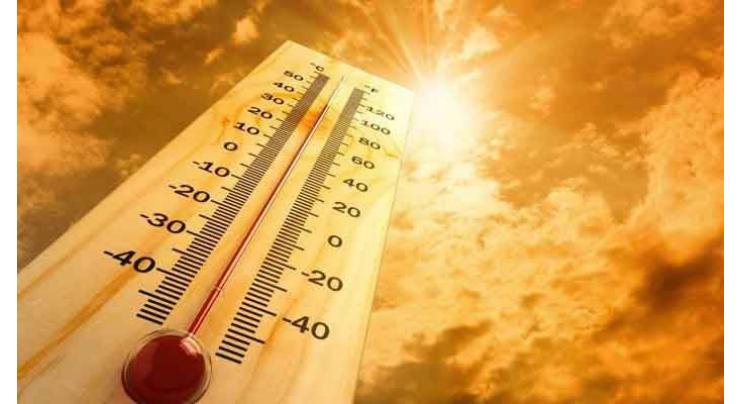
- Home
- Pakistan
- News
- Climate Training participants call for coordinated planning, concerted actions against Heatwave
Climate Training Participants Call For Coordinated Planning, Concerted Actions Against Heatwave
Fahad Shabbir (@FahadShabbir) Published May 23, 2022 | 07:19 PM

Journalists, university students and civil society members from different parts of the country have stressed for coordinated planning and concerted actions by government, civil society and private sector against heatwave and its impact in the country
PESHAWAR, (UrduPoint / Pakistan Point News - 23rd May, 2022 ) :Journalists, university students and civil society members from different parts of the country have stressed for coordinated planning and concerted actions by government, civil society and private sector against heatwave and its impact in the country.
These views were expressed by them during an online training session on Heatwaves and Climate Change (May 21, 2022) organized by Resilient Future International Pvt Ltd.- an Islamabad based research and training company, says a press release issued here on Monday.
Aftab Alam Khan, Chief Executive of Resilient Future International and lead trainer explained that numerous research reports confirmed that heatwaves had increased due to climate change.
Most notable among them are recent publications of Sixth Assessment Report (AR6) by Intergovernmental Panel on Climate Change (IPCC). These reports are prepared by thousands of scientists and approved by almost all governments in the world.
For instance, 'Impacts, Adaptation and Vulnerability' publication of IPCC-AR6 launched in February 2022 had already warned that Pakistan and other South Asian countries would face higher frequency of heatwaves with greater intensity and longer duration.
Aftab Alam underscored disproportional impact of heatwaves on poor and marginalized communities particularly women, children, outdoor laborers, elderly, disabled and transgender persons.
Heatwaves have negative impacts on physical and mental health. Beside heatstroke, heart and kidney patients are also vulnerable. Heatwaves lead to mental stress and increased violent behaviors by individuals and groups.
The current heatwave in the country, according to estimates of Space and Upper Atmosphere Research Commission (SPARCO), has caused 10 percent losses in wheat production, which amounts to around 3 million tons of wheat.
He suggested water smart and climate resilient methods in agriculture and industrial production.
The recent outburst of Shisper Glacier lake was connected with heatwave. Normally these lakes were formed in May or June. However, the heatwave started in March resulted in formation of lake in April, Aftab added.
This year March was the hottest month in the history of Pakistan. Temperature in Jacobabad reached 51 Celsius against the average of 43.8 Celsius. Nawabshah faced 50.5 Celsius against average of 44.6 and Moenjodaro reached 50 Celsius against its average temperature of 44 Celsius.
Ali Jabir, a senior climate journalist emphasized training needs for journalists to improve climate related stories. He explained various climate related terminologies for the participants. Jabir also explained zig-zag technology to convert brick kilns into climate smart production units.
Amir Sohail, a journalist from Swabi, Khyber Pakhtunkhwa noted that highways construction in Khyber Pakhtunkhwa should avoid tree cuttings and ensure timely plantation of trees.
Imran Baloch of Green Rural Development Organization, Hyderabad Sindh stressed upon regular training programs on climate change. He also noted that water logging and salinity in Sindh impacted negatively agricultural production and income of poor farmers.
Hamza Yousaf, a student of International Islamic University, talked about pollution created by plastic bags and emphasized need of community and government actions against the menace.
Related Topics
Recent Stories

National team determined for good performance against New Zealand: Babar Azam

Currency Rate In Pakistan - Dollar, Euro, Pound, Riyal Rates On 18 April 2024

Today Gold Rate in Pakistan 18 April 2024

Saka and Odegaard start for Arsenal, Guerreiro in Bayern midfield

Qatar PM says re-evaluating Israel-Hamas mediation role

Govt spokesperson terms allegations of PTI's Marwat against Saudi Arabia 'heinou ..

Minister appreciate UAE’s support for Pakistan economic challenges

Manchester City v Real Madrid Champions League starting line-ups

MIGA's support Pakistan in attracting foreign investments: Federal Minister for ..

Walker returns to captain Man City for Real Madrid clash

Action taken against price list violations in Khanewal district

DC chairs review meeting of DEG
More Stories From Pakistan
-
Due to recent rains, floods roads closed, work on opening routes continue
3 minutes ago -
Islamabad Police committed to resolve public issues on priority: DIG Operations
12 minutes ago -

Govt spokesperson terms allegations of PTI's Marwat against Saudi Arabia 'heinous attempt'
11 hours ago -

Action taken against price list violations in Khanewal district
12 hours ago -

DC chairs review meeting of DEG
12 hours ago -

Govt to ensure timely water supply in backward areas of Sindh: Jam Shoro
12 hours ago
-

Bilawal condemns attack on PPP candidate in Bajaur
12 hours ago -

PRCS observed World Hemophilia Day
12 hours ago -

Rain forecast across Kashmir on April 18th-19th
12 hours ago -

Local trader killed after abduction
12 hours ago -

Commissioner Karachi chairs meeting on civic problems
12 hours ago -

Blind murder traced, 5 including constable arrested
12 hours ago









